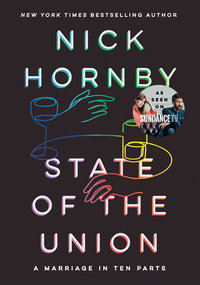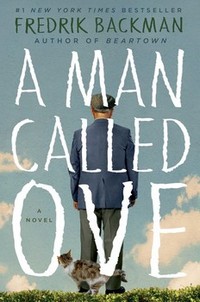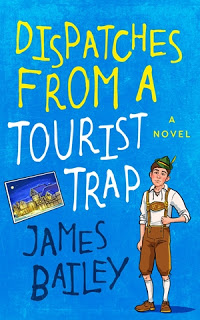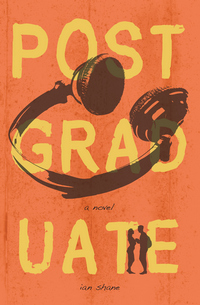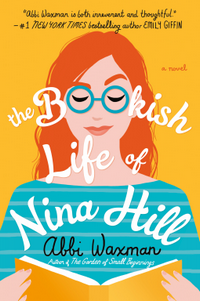 The Bookish Life of Nina Hill
The Bookish Life of Nina Hill
by Abbi Waxman
eARC, 352 pg.
Berkley Books, 2019
Read: July 1 – 3, 2019

I think it’s entirely fitting to start my post about this book by talking about another book (Nina Hill would approve, maybe even insist on it). I remember a lot of what I read about High Fidelity in the late 90’s (I was a little late to the party), was about guys saying to either hand the book to women to help them understand how we think — or to keep it out of their hands, for the very same reason. That resonated with me. I never thought for a second that I was Rob, Dick or Barry, but we thought the same way, we had a similar weltanschauung — their banter was scripted, where mine frequently fumbled — but overall, they were proof that I wasn’t the only one in the world who thought that way. It took me less than two chapters to feel the same way about Nina Hill — our tastes differ somewhat, she’s more clever than I am, and there’s the ridiculous affection for felines — but on the whole, she’s my kind of person. In fact, many of the people in this book are — she’s just the best example of it.
The authorial voice — Nina’s voice, too — is fantastic. I seriously fell head over heels almost instantly with them. The narrative is specific, funny, observant, compassionate, and brutally honest — mostly funny. It’s just so well-written that I knew (and said publicly) by the end of the first chapter that this was going to be in my personal Top 3 for 2019 — I’ve had some time to think about this, and have reconsidered. I’m confident it’ll be in the Top 5, but I should give the rest of the year a little room to compete. It’s one of those books that’s so well-written you don’t care what or who it’s about, as long as you get to read more of that wonderful prose. By chapter 4 — and several times after that — I had to self-consciously stop myself from highlighting and making glowing notes — because if I didn’t, I’d end up never finishing the book (I still have a lot of notes and passages highlighted).
Let me try to explain via a tortured metaphor (this is where you see why I blog about books, and not write my own). Say you’re taking a road trip, say, to go look at autumn leaves and you know the city you’ll be staying in, but know that there are about 18 different ways for the driver to arrive in that city. You know the whole time where you’ll end up, but you don’t have a clue how you’ll get there, what kind of foliage you’ll see (hint: it’ll be brown, red or orange), what the roads will be like, or what random and surprising things might happen along the way. It’s not about the destination, it’s the journey — as the fortune cookies and high school graduation speeches tell you. This book is the same way — readers are going to know pretty much where this book is going to end up once they’ve read a few chapters. What they don’t know is how they’ll get there, what they’ll see on the way, what kind of surprises will be along the way, and how fast they’ll get there. It’s in these things that Waxman excels — her plotting is pretty obvious, but her execution is dazzling and often unexpected. (I want to stress that this is an observation, not a criticism)
Nina Hill is a reader — books are how she defines herself, the prism through which she sees and interacts with the world. She has a job (bookseller), a cat, a small home with a lot of shelves, a trivia team, book club, a place she exercises, a visualization corner, a fantastic planner and a love of coffee and quality office products. Her life is pretty regimented, but everything is just how she likes it. She also is introverted, prone to anxiety, and averse to change. Nina’s smart with a great memory, a penchant for honesty, and highly-developed sense of who she is.
Her friends are essentially the women she works with and the members of her trivia team — all of whom are intelligent, witty, well-read and fun. The kind of people I’d love to hang out with over coffee or wine for a few hours a week.
Nina’s mother is a noted and award-winning photojournalist and spends most of her time traveling the world being one. Nina was largely raised by a Nanny (although her mother visited frequently). Nina has never known a father.
Until one day her life changes — a lawyer arrives with some news. Her father is dead. Apparently, her mother discovered he was married and refused to have anything further to do with him. He was absolved of any need to support Nina or her mother as long as he never made contact with her. Which he honored — but made provisions for him in his will.
Her father was a successful entertainment lawyer, and a serial monogamist. He was married three times (one divorce, one widowing, and one marriage intact), had several children and more grandchildren (there are contextually appropriate and helpful graphics to help you understand the family structure). Nina went from being alone in the world to being a sister, an aunt and a grand-aunt in one conversation. She slowly meets various members of the family — discovering similar personality traits, interests and physical characteristics. The family she meets is wonderful — I could easily spend more time with them all. One brother and a nephew (who is older than her) in particular stand out — she gets to know them sooner and deeper than the rest. But many others are on their heels, and even the least-likable among them turn out to be great (with one exception, but that’s by design).
While reeling from the changes of learning she has an extended family, starting to meet them, and learning about her father — another thing happens in her life. There’s a member of a rival trivia team that she finds attractive, and who just may find her attractive. They have similar tastes and many shared interests, but he seems to know a lot about sports (including what “a Don Shula” is) and isn’t much of a reader. But there’s something about him . . .
There are three significant child characters in the novel — they’re not around much, but when they are, they have a large impact on the plot. They are all pretty unrealistic, talking and (apparently) thinking in ways that are immature, but not how kids talk and/or think. But they’re so adorable that you forgive Waxman immediately for these overly-precocious children. It’s not a major thing, I just wanted to say something less-than-positive about the book, and this is all I could come up with.
Throughout the novel, Nina learns how little she’s really alone in the world and how she might be able to find time for more people in her life — without losing who she is and too much reading time. This is the core of the novel and everything else is in service to this goal. While this is going on, there are plenty of laughs, chuckles and wit to carry the reader from plot point to plot point.
It’s a good thing that I stopped quoting from ARCs (I almost never got around to verifying the lines in the published version), because this post would either never be completed or would be so long that I’d be the only one who’d read the whole thing. I had to stop myself — repeatedly, actually — from highlighting great lines. Particularly comments Nina made to others (or the Narrator made on her behalf) about books and/or reading. Book memes are going to be mining this novel for years — you’ve seen 357 variations on the Tyrion lines about reading, or the 200+ takes on “Books were safer than people anyway” from The Ocean at the End of the Lane. Folks, Nina Hill is going to bury both of them.
According to Goodreads, I’ve read 122 books so far in 2019. If pressed, I’d easily say this is better than 120 of them, and might tie the other (it’s a lot more fun, I can say without a doubt). Your mileage may vary, obviously, but I can’t imagine a world where anyone who reads my blog not enjoying this novel and protagonist. It’s charming, witty, funny, touching, heart-string-tugging, and generally entertaining. I don’t know what else to say other than: Go, go read this, go buy it, expect it as a gift from me (if you’re the type to receive gifts from me, I’m not buying one for all of you on my wages, as much as I might want to).
Disclaimer: I received this eARC from Berkley Publishing Group via NetGalley in exchange for this post — thanks to both for this great opportunity!!
—–

![]()


